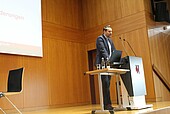This year's Health Economics Talks were dedicated to the highly topical subject of "Green Health". Experts and practitioners from the health sector discussed both aspects of the topic: Under the title "Climate change and health", the consequences of climate change for the health of the population were discussed. A second thematic block dealt with practical approaches to sustainability management and the associated impetus for innovation. Ministerial Director Daniel Stich from the Rhineland-Palatinate Ministry of Science and Health (MWG) provided the political impetus. The symposium was organized by the Institute for Management, Economics and Healthcare (IMÖVG) at the Ludwigshafen University of Business and Society (HWG LU) and took place on 13.10.2023.
" The megatopics of climate protection, sustainability and health associated with the title 'Green Health' are cross-cutting issues that link social, political, economic and scientific areas and are also of particular strategic importance for the profile of the Ludwigshafen University of Business and Society," explained University President Prof. Dr. Gunther Piller in his welcoming address, adding: "Next year, two new degree programs will be launched at the Department of Management, Controlling, HealthCare, a Bachelor's and a Master's, on the topic of sustainability".
Prof. Dr. Eveline Häusler, initiator and academic co-director of this series of events, which has now been running for 20 years, then gave a more in-depth introduction to the topic: With a share of around 5% of national greenhouse gas emissions, the healthcare sector has a deep ecological footprint. This applies similarly to water consumption, waste and other factors. At the same time, service providers, health insurance companies and the industrial healthcare sector, as well as public administrations, face major challenges when it comes to tackling the health consequences of climate change, Häusler said in her introduction. "The effects of climate change are a key aspect in the future design of a resilient healthcare system. Green health therefore addresses both the need to reduce harmful ecological and social consequences in connection with healthcare services - be it in production, transportation, use or disposal - as well as the change in the need for care," Häusler continued.
These two dimensions of the topic were also addressed by Ministerial Director Daniel Stich from the Rhineland-Palatinate Ministry of Science and Health. In his keynote speech, he addressed both sustainable healthcare, starting with preventative measures to promote health, through healthcare to aftercare and rehabilitation measures, as well as the consequences of climate change for the healthcare system. "Climate change is the greatest global challenge and also a particular challenge for our healthcare system," said Stich, referring to studies by the World Health Organization (WHO), adding: "Germany and Rhineland-Palatinate are also affected." Increased resistance to antibiotics, the rising risk of Lyme disease, the occurrence of West Nile fever in northern latitudes, increased bacterial contamination in water and a greater number of heat-related deaths were just a few examples cited by Stich. Taking cross-departmental measures to reduce climate-damaging emissions and adapt to climate change is therefore of great importance: the heat action plan is a building block for this, as is the unsealing of surfaces, the greening and shading of city centers or the targeted reduction in emissions from healthcare facilities such as hospitals, said Stich.
The connection between climate protection, climate adaptation and health protection using the example of municipalities was then explained in more detail by Dr. Michael Eichinger from the University Medical Center Mannheim and Mainz in his presentation "Climate change and health: climate protection as health protection". Like Stich, the head of the Child and Adolescent Health Care Research working group at the University of Mainz and the Planetary Health working group at the Mannheim Medical Faculty of Heidelberg University was convinced that the climate crisis was also a health crisis and that it would also lead to a social crisis. The "planetary polytrauma" had progressed far in the years 2015 to 2023 alone and with it the health risk situation. 'Planetary health' must therefore be implemented as a central cross-cutting topic in government structures and transdisciplinary cooperation must be established across sectors. The development, implementation and evaluation of interventions that have a positive impact on the environment and health should be at the forefront. The good news: "There are few conflicts of objectives between the individual departments," Eichinger was convinced.
In the second thematic block, the Health Economics Talks dealt with innovative approaches to sustainability management from professional practice: Burak Isiksal, Head of Infrastructure, Construction and Purchasing at the BG Klinik Ludwigshafen, gave an insight into the perspective of hospitals; Elke Ruppert from Siemens Betriebskrankenkasse gave the perspective of health insurance companies. Thomas Hugendubel from Roche Pharma AG then spoke on the topic of sustainability management from the perspective of the pharmaceutical industry, supplemented by a contribution from Christina Loch, Head of CSR & Sustainability at Caritasverband Speyer, from the perspective of nursing care. Here, as well as in the subsequent panel discussion, it became clear that ambitious sustainability goals can only be achieved if the players along the entire value chain and across professional groups work together. Sustainability therefore has the potential to become a further driver of cross-sector collaboration, it was concluded.
Not least the students were impressed by the practical experience and impulses shared by the speakers. A key insight from the students' perspective was that the topic of sustainability affects all sub-sectors of healthcare in a variety of ways and is already being actively addressed.
Prof. Dr. Verena Vogt from Jena University Hospital introduced a further aspect of the topic into the discussion after the lunch break: In her presentation "Reducing overuse", she pointed out the problematic consequences of misuse and overuse from an ecological perspective.
Ceremonial presentation of the health economics awards
This year's Health Economics Talks once again concluded with the presentation of the prizes for the best Bachelor's and Master's theses sponsored by the Health Economics Sponsorship Association (GiP). Vanessa Gergereder received the prize of 700 euros for her bachelor's thesis "Leadership in the context of New Work using the example of the management guidelines of the Siemens company health insurance fund"; Saskia Staiger received the prize of 800 euros for her master's thesis "Health Literate Organizations - a concept for elderly care facilities in Germany?". The prizes were presented by Rüdiger Burkhard, 2nd Chairman of the Association for the Promotion of Health Economics.
Background information: Health Economics Talks
The Health Economics Talks have been bringing together expertise, decision-makers from all areas of healthcare, politics and science at the university for 20 years and provide impetus to successfully master the challenges facing this innovative industry in the interests of efficient medical care. The Health Economics Talks 2024 will take place on November 8, 2024.
The Health Economics Talks are sponsored by the Förderverein Gesundheitsökonomie an der Hochschule Ludwigshafen e.V.
Further information at: www.hwg-lu.de/studium/bachelor/gip/gesundheitsoekonomische-gespraeche
Specialist contact:
Ludwigshafen University of Business and Society
Institute for Management, Economics and Health Care (IMÖVG)
Simone Kuhn
Tel. 0621 5203-197
imoevg@ 8< SPAM protection, please remove >8 hwg-lu.de







